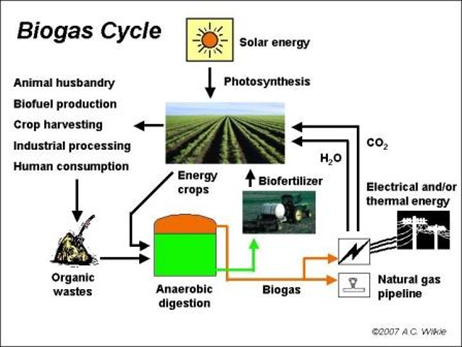

9th April 2022 (7 Topics)
Context
Ensuring healthy lives and promoting well-being for everyone at all ages is one of the key sustainable goals of the United Nation’s 2030 agenda for sustainable development.
- In this regard, biogas can be a sustainable solution for curbing pollution, improving livelihood and enhancing quality of life.
About
Need of a sustainable solution like biogas:
- Pollution caused by burning wood, fossil fuels and other materials (like refuse-derived fuel utilised in waste-to-energy plants) to produce energy for cooking, heating and lighting is one of the major roadblocks to improving health and quality of life for people.
- Pollutants emitted due to the burning of fossil fuels and biomasses not only affect the health of people but are also responsible for climate change.
- Every year, India generates almost 62 million tonnes of municipal solid waste (MSW), roughly half of which is organic in nature.
- This organic fraction of MSW decomposes to produce methane, when disposed improperly like in landfills.
- Disposing of organic wastes in landfills or burning trash is an environmental as well as health hazard.
- Apart from causing greenhouse gas (GHG) emissions, such unscientific waste disposal leads to diseases like dengue fever and malaria.
- Many chronic illnesses like asthma, emphysema, cancer and heart disease have also been linked to air pollution by numerous studies.
- Leaching of toxic substances from landfills contaminates the groundwater.
- Decomposing organic matter releases huge amounts of methane into the environment, causing air pollution and global warming as methane is a very potent GHG.
- Installing large-scale municipal biogas systems can help cities handle organic waste efficiently to overcome the environmental and socio-economic challenges posed by overburdened landfills.
- Municipal waste can be fed into these plants to create clean and green fuel, along with bio-fertilisers, while keeping the cities clean and hygienic.
- According to WHO, over four million people die every year all over the world due to high levels of indoor air pollution caused by the burning of fossil fuels and biomass
Biogas:
- Biogas is based upon the use of dung to produce gas which is used as domestic fuel, especially in rural areas
- Biomass has always been an important energy source for the country considering the benefits it offers. It is renewable, widely available, carbon-neutral and has the potential to provide significant employment in the rural areas
- The technique is based on the decomposition of organic matter in the absence of air, to yield gas consisting of methane (55%) and Carbon Dioxide (45%), which can be used as source of energy.
- It can be used as cooking and lighting fuel; and the left over slurry serves as enriched manure.
- This has taken deep roots in India, as it has higher thermal efficiency when compared with Kerosene, firewood, dung and charcoal.

Benefits of Biogas:
- Biogas can play a critical role in transforming the energy dependence of rural and agricultural communities, which majorly depends on burning wood, dung, charcoal, coal and other fossil fuels for their energy needs.
- The biogas solution can help make our cities clean and pollution-free.
- Installing biogas plants at the micro- and macro-level can address the critical issues of handling livestock manure and agricultural wastes, deteriorating soil quality, water pollution and deforestation.
- A fully functional biogas digester, for every tonne of feedstock processed, can reduce approximately 2.83 tonnes of carbon dioxide emissions in a year.
- Using biogas digesters to convert organic waste into clean energy can significantly contribute to countering challenges like pollution, climate change, livelihood inequalities and health in individual households as well as entire communities.
- The positive impact of biogas does not end with providing energy inclusivity and reducing emissions.
- It also plays a crucial role in improving soil quality. The digestate, a by-product generated in the biogas plants, can be used as a bio-fertiliser as it is rich in organic content and revitalises the soil.
- The digestate is rich in micro- and macro-nutrients required by the plants and can replace the synthetic fertilisers that deteriorate the soil quality over time.
- The use of bio-fertilisers not only increases crop yield but also improves the nutrient content of the produce, thereby improving the health and well-being of consumers as well as that of soil.
- Biogas can also help in reducing gender inequalities and empowering women, which, in turn, will improve the quality of lives.
- Biogas can significantly contribute to achieving several UN-mandated sustainable development goals (SDG) such as zero hunger; good health and wellbeing; gender equality; clean water and sanitation; sustainable, affordable and clean energy; decent work and economic growth; reduced inequalities; sustainable cities and communities; and climate action.


